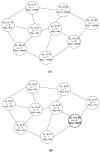ENERDGE: Distributed Energy-Aware Resource Allocation at the Edge
- PMID: 35062619
- PMCID: PMC8778252
- DOI: 10.3390/s22020660
ENERDGE: Distributed Energy-Aware Resource Allocation at the Edge
Abstract
Mobile applications are progressively becoming more sophisticated and complex, increasing their computational requirements. Traditional offloading approaches that use exclusively the Cloud infrastructure are now deemed unsuitable due to the inherent associated delay. Edge Computing can address most of the Cloud limitations at the cost of limited available resources. This bottleneck necessitates an efficient allocation of offloaded tasks from the mobile devices to the Edge. In this paper, we consider a task offloading setting with applications of different characteristics and requirements, and propose an optimal resource allocation framework leveraging the amalgamation of the edge resources. To balance the trade-off between retaining low total energy consumption, respecting end-to-end delay requirements and load balancing at the Edge, we additionally introduce a Markov Random Field based mechanism for the distribution of the excess workload. The proposed approach investigates a realistic scenario, including different categories of mobile applications, edge devices with different computational capabilities, and dynamic wireless conditions modeled by the dynamic behavior and mobility of the users. The framework is complemented with a prediction mechanism that facilitates the orchestration of the physical resources. The efficiency of the proposed scheme is evaluated via modeling and simulation and is shown to outperform a well-known task offloading solution, as well as a more recent one.
Keywords: Markov Random Fields; edge computing; energy optimization; resource allocation; task offloading.
Conflict of interest statement
The authors declare no conflict of interest.
Figures














References
-
- Jeon Y., Baek H., Pack S. Mobility-aware optimal task offloading in distributed edge computing; Proceedings of the 2021 International Conference on Information Networking (ICOIN); Jeju Island, Korea. 13–16 January 2021; pp. 65–68.
-
- Bebortta S., Senapati D., Panigrahi C.R., Pati B. An adaptive performance modeling framework for QoS-aware offloading in MEC-based IIoT systems. IEEE Internet Things J. 2021 doi: 10.1109/JIOT.2021.3123554. - DOI
-
- Sahni Y., Cao J., Zhang S., Yang L. Edge mesh: A new paradigm to enable distributed intelligence in internet of things. IEEE Access. 2017;5:16441–16458. doi: 10.1109/ACCESS.2017.2739804. - DOI
-
- Li S., Zhang N., Lin S., Kong L., Katangur A., Khan M.K., Ni M., Zhu G. Joint admission control and resource allocation in edge computing for internet of things. IEEE Netw. 2018;32:72–79. doi: 10.1109/MNET.2018.1700163. - DOI
-
- Thai M.T., Lin Y.D., Lai Y.C., Chien H.T. Workload and capacity optimization for cloud-edge computing systems with vertical and horizontal offloading. IEEE Trans. Netw. Serv. Manag. 2019;17:227–238. doi: 10.1109/TNSM.2019.2937342. - DOI
Grants and funding
LinkOut - more resources
Full Text Sources

